The Missile Seekers Market is estimated to be valued at USD 7.3 billion in 2025 and is projected to reach USD 13.6 billion by 2035, registering a compound annual growth rate (CAGR) of 6.5% over the forecast period. During the initial phase from 2020 to 2025, the market value rises from USD 5.3 billion to USD 7.3 billion, driven by increasing defense budgets globally and the growing need for advanced targeting and guidance systems in military applications.
This period is characterized by technological advancements in seeker systems, including improvements in infrared, radar, and electro-optical sensors that enhance missile accuracy and effectiveness. The adoption of missile seekers in various platforms, including air-to-air, surface-to-air, and anti-ship missiles, further supports market growth. Between 2026 and 2030, the market expands from USD 7.7 billion to USD 9.9 billion, fueled by ongoing modernization programs, rising geopolitical tensions, and the development of next-generation missile technologies incorporating artificial intelligence and enhanced sensor fusion capabilities.
The demand for precise targeting solutions in both offensive and defensive weapon systems contributes to sustained growth. From 2031 to 2035, the market accelerates from USD 10.6 billion to USD 13.6 billion, propelled by increased investments in autonomous missile systems, advancements in seeker miniaturization, and the integration of multi-spectral sensor technologies. Emerging economies' growing focus on military modernization also drives market expansion. Overall, the missile seekers market is poised for robust and sustained growth through 2035, supported by continuous innovation, evolving defense strategies, and escalating global security concerns.
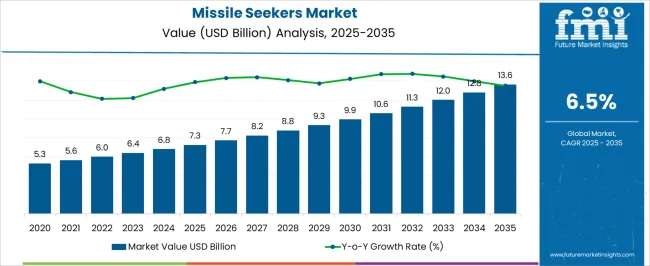
| Metric | Value |
|---|---|
| Missile Seekers Market Estimated Value in (2025 E) | USD 7.3 billion |
| Missile Seekers Market Forecast Value in (2035 F) | USD 13.6 billion |
| Forecast CAGR (2025 to 2035) | 6.5% |
The missile seekers market is witnessing steady advancement driven by increasing geopolitical tensions, rising defense modernization budgets, and growing demand for precision-guided munition systems. Global defense agencies are focusing on enhancing strike accuracy and mission efficiency, leading to widespread adoption of advanced seeker technologies.
As threats evolve in complexity and speed, the ability of seekers to support beyond-visual-range targeting, multi-spectral tracking, and dynamic guidance is becoming critical. Integration of artificial intelligence, sensor fusion, and real-time data processing within seeker systems is further strengthening their strategic importance.
Investments in indigenous missile programs, especially in emerging defense economies, are creating robust demand for locally adaptable and interoperable seeker solutions. The transition from standalone targeting to network-centric engagement models is also catalyzing seeker innovation across multiple launch platforms.
The missile seekers market is segmented by technology, missile type, launch mode, and geographic regions. The missile seekers market is divided into Radar Seekers, Infrared Seekers, Laser Seekers, and Others. The missile seekers market is classified by missile type into Cruise Missile, Ballistic Missile, Interceptor Missile, and Conventional. Based on launch mode, the missile seekers market is segmented into Air-to-Air, Air-to-Ground, Surface-to-Air, and Surface-to-Surface. Regionally, the missile seekers industry is classified into North America, Latin America, Western Europe, Eastern Europe, Balkan & Baltic Countries, Russia & Belarus, Central Asia, East Asia, South Asia & Pacific, and the Middle East & Africa.
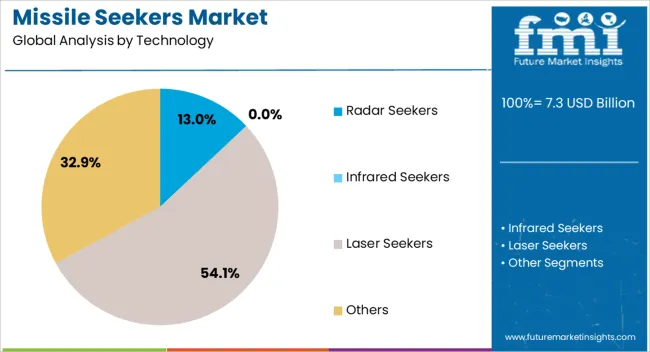
Radar seekers are anticipated to remain a key technology in the missile seekers market through 2025. Their dominance is being reinforced by their all-weather targeting capability, ability to function in GPS-denied environments, and increasing miniaturization without compromising tracking range.
Radar seekers are being integrated into multiple missile classes due to their capability to lock onto moving targets with high precision, particularly under hostile jamming and countermeasure conditions. Advancements in active electronically scanned array (AESA) radar modules have further enhanced resolution and target discrimination, enabling effective engagement against modern threats such as stealth aircraft and high-speed projectiles.
Continued investment in long-range strike and anti-access/area denial (A2/AD) strategies by global militaries is ensuring sustained demand for radar-based seekers across air, sea, and land domains.
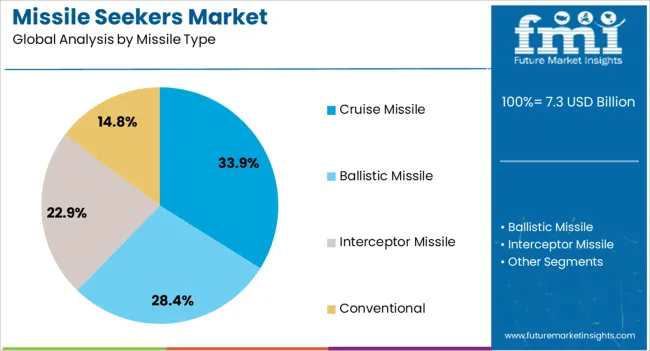
Cruise missiles are expected to account for 33.90% of the missile seekers market revenue in 2025, making them the leading missile type. This is being driven by their strategic role in deep strike missions and their ability to carry high-precision warheads across extended ranges.
Cruise missiles rely heavily on advanced seekers for low-altitude navigation and terrain-following accuracy, especially in contested environments. The growing need for stealthy, adaptable, and precision-guided strike solutions is accelerating seeker integration in next-generation cruise missile programs.
Enhanced propulsion systems and digital guidance modules are enabling longer mission durations, where seekers must maintain target lock for extended periods. As militaries prioritize surgical strikes with minimal collateral damage, cruise missiles equipped with intelligent seeker heads are becoming a core component of national defense arsenals.
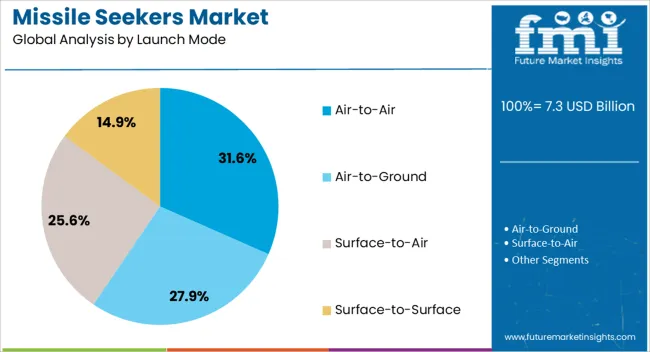
Air-to-air launch platforms are projected to contribute 31.60% of the total revenue in the missile seekers market by 2025, positioning them as a dominant launch mode. The increasing need for beyond-visual-range is influencing this (BVR) combat capabilities and enhanced aerial engagement flexibility.
Air-to-air missiles require highly responsive seekers to manage dynamic interception scenarios, particularly when engaging maneuvering enemy aircraft at supersonic speeds. Miniaturized seekers with dual-mode (infrared and radar) functionality are being adopted to improve accuracy and survivability in cluttered airspace.
Air superiority doctrines are placing greater emphasis on seeker performance to ensure successful first-shot engagements. With the global trend toward multirole fighter aircraft and unmanned aerial combat systems, demand for agile and advanced seekers in air-launched configurations is projected to remain high.
The missile seekers market is driven by increasing demand for precision munitions, rising geopolitical tensions, and the integration of seekers into diverse military platforms. However, countermeasures and the growing cost of innovation are challenges manufacturers face in keeping pace with defense needs.
The missile seekers market is driven by the increasing adoption of precision-guided munitions (PGMs) across various defense sectors. As military operations demand greater accuracy in targeting and minimal collateral damage, missile seekers play a critical role in ensuring missile accuracy. Modern warfare requires systems that can accurately guide munitions to their intended targets, and missile seekers, including infrared and radar systems, are at the forefront of this shift. The growing defense budgets of nations, along with advancements in missile guidance systems, have significantly contributed to the demand for missile seekers. As a result, there is a surge in production and innovation to meet military requirements for enhanced precision in missile systems.
Rising geopolitical tensions and an increase in military spending across the globe have further fueled demand for missile seekers. Nations facing security threats are investing heavily in advanced missile systems to strengthen their defense capabilities. Missile seekers, particularly those used in air defense, are integral to countering threats from enemy missiles and aircraft. The growing importance of national security, coupled with territorial disputes and the arms race among global superpowers, has led to greater investments in defense technologies, including missile seekers. As countries strive to modernize their armed forces, missile seekers will continue to be a priority for enhancing the accuracy and reliability of missile defense systems.
The missile seekers market is witnessing increased integration of seekers into a variety of military platforms, including air, land, and naval systems. The versatility of missile seekers across different platforms ensures their growing importance in both offensive and defensive operations. In the air defense segment, missile seekers are vital for missile interception, while in naval defense, they are crucial for enhancing missile targeting and strike capabilities. The integration of missile seekers into ground-based systems further amplifies their role in modern military strategies. As military forces prioritize the integration of advanced guidance systems into diverse platforms, missile seekers are becoming essential components for both strategic and tactical operations.
While missile seekers have become more advanced, the rise of countermeasures also presents a challenge to their effectiveness. Advancements in enemy defense technologies, such as jamming and decoy systems, have led to the development of more sophisticated missile seekers capable of evading these countermeasures. To maintain missile accuracy, seekers are being designed with advanced algorithms and multi-spectrum sensors to track and target missiles or aircraft in complex environments. However, this has led to higher costs and longer development cycles. As missile defense systems evolve, manufacturers are continually improving missile seekers to ensure their systems remain effective against new countermeasures, supporting long-term defense strategies.
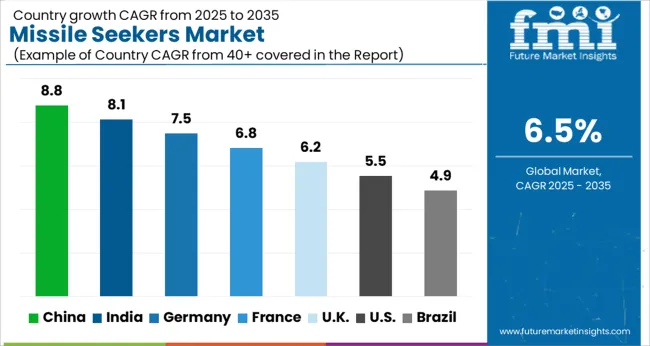
The missile seekers market is projected to grow globally at a CAGR of 6.5% from 2025 to 2035, driven by increasing defense budgets, advancements in missile technology, and the growing demand for high-precision targeting systems. China leads with a CAGR of 8.8%, fueled by significant investments in defense technologies, rapid advancements in missile systems, and the country’s focus on military modernization. India follows at 8.1%, driven by rising defense spending, a growing need for advanced missile systems, and strategic defense initiatives.
France grows at 6.8%, supported by strong demand for missile seekers in defense and aerospace sectors, as well as increasing investments in missile defense systems. The United Kingdom achieves a CAGR of 6.2%, boosted by its ongoing defense programs, while the United States records a CAGR of 5.5%, driven by continued development of next-generation missile systems and missile defense technologies. This growth trajectory reflects the increasing focus on military innovation, high-tech defense solutions, and the rising demand for precision targeting capabilities in modern warfare across global defense sectors.
The UK’s missile seekers market grew at a CAGR of 4.9% from 2020 to 2024 and is expected to rise to 6.2% during 2025-2035. The growth during 2020-2024 was steady but moderate, driven by ongoing investments in defense technologies, modernization of missile systems, and the need for advanced precision-guided munitions. However, as global defense spending increases and the UK focuses on developing next-generation defense technologies, the market is expected to accelerate. The demand for high-tech seekers in missile systems, particularly for air-defense systems, will continue to grow in the coming years. The expansion of defense partnerships and strategic collaborations within NATO will contribute to further market growth. Innovations in seeker technologies, such as infrared and radar-guided systems, will enhance the market’s growth potential in the UK.
China is projected to grow at a CAGR of 8.8% in the missile seekers market during 2025-2035, well above the global CAGR of 6.5%. The market grew at a CAGR of 7.2% from 2020 to 2024, driven by China's significant investments in defense technologies, military modernization, and the development of advanced missile systems. The acceleration in growth over the next few years will be attributed to China’s push to strengthen its military capabilities, focusing on developing high-precision missile seekers and next-generation missile defense systems. With increasing investments in aerospace and defense technologies and a rising emphasis on technological self-reliance, the demand for sophisticated missile seekers will continue to grow. Additionally, China’s strategic initiatives to modernize its military and enhance missile capabilities in various defense sectors will further fuel market demand.
India’s missile seekers market is expected to grow at a CAGR of 8.1% during 2025-2035, surpassing the global average of 6.5%. The market grew at a CAGR of 7.3% from 2020 to 2024, driven by increasing defense spending, the development of indigenous defense technologies, and rising demands for precision-guided missile systems. As India continues to modernize its defense capabilities, the demand for advanced missile seekers will increase, especially with the development of more sophisticated air and ground defense systems. India’s growing defense collaborations and partnerships with global powers like the USA and Russia will further boost the market. Strategic efforts to reduce reliance on foreign technologies will lead to the domestic production of advanced seeker systems.
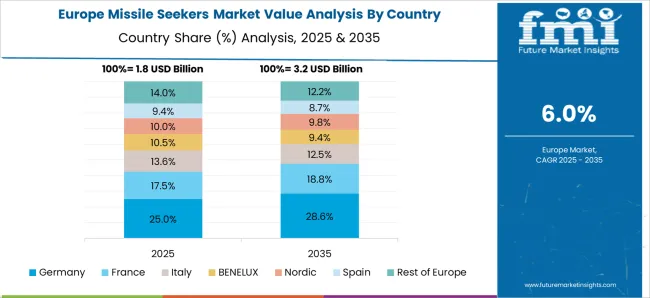
France’s missile seekers market is projected to grow at a CAGR of 6.8% from 2025 to 2035. The market grew at a CAGR of 6.0% from 2020 to 2024, driven by France’s strong aerospace and defense sectors, as well as increasing investments in military technologies. The acceleration in growth in the coming decade will be attributed to France’s commitment to improving its missile defense systems, enhancing the precision of its missile seekers, and expanding its defense capabilities within the European Union and NATO frameworks. France’s focus on advancing missile defense technologies and enhancing the performance of air-defense systems will further fuel market growth. France’s participation in multinational defense collaborations will increase the demand for cutting-edge missile seeker technologies.
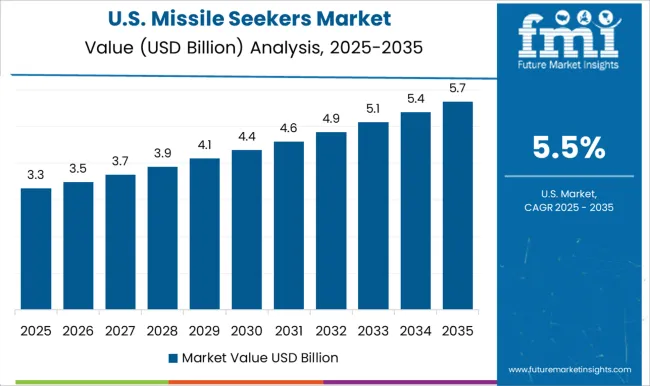
The USA missile seekers market is projected to grow at a CAGR of 5.5% during 2025-2035. The market grew at a CAGR of 4.8% from 2020 to 2024, driven by the USA defense sector’s continued investment in missile defense systems and advanced seeker technologies. The market is expected to rise in the coming decade due to ongoing military modernization efforts, the development of next-generation missile systems, and the increasing importance of precision-guided weaponry in modern warfare. As global tensions rise, the USA will continue to develop and deploy advanced missile seekers to maintain its strategic military advantage. The development of advanced missile defense systems, air-defense systems, and precision guidance technologies will further fuel market demand.
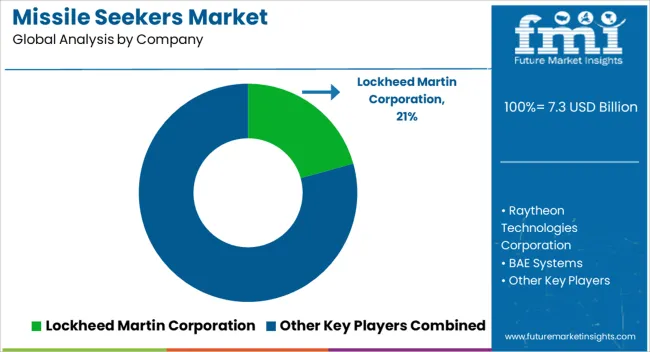
The missile seekers market is highly competitive, with global defense giants and specialized players offering advanced guidance technologies to meet the growing demand for precision in military operations. Lockheed Martin Corporation leads the market with cutting-edge missile seeker systems integrated into a wide range of advanced weaponry, including air-to-air and surface-to-air missiles.
Raytheon Technologies Corporation offers a comprehensive portfolio of infrared, radar, and multispectral seekers for missiles used in defense and security operations worldwide. BAE Systems stands out with its high-performance seekers for tactical and strategic missile systems, emphasizing precision targeting and reliability. Northrop Grumman is known for its advanced missile seeker technologies used in both defensive and offensive systems, enhancing missile accuracy in complex combat scenarios. L3Harris Technologies, Inc. delivers advanced electro-optical and infrared seekers, integrating them into integrated defense solutions for enhanced target detection and missile guidance.
Thales Group focuses on radar and infrared seeker technologies, providing cutting-edge solutions for modern air defense systems. Boeing, a major player in aerospace and defense, offers highly advanced seeker systems used in missile guidance, specializing in both military and commercial aerospace applications. Competitive strategies in this market focus on expanding the adoption of multi-spectral seeker technologies, integrating AI-driven systems for enhanced targeting, and advancing stealth capabilities to counter emerging threats. The market growth is further driven by rising geopolitical tensions, increasing defense spending, and evolving military needs for high-precision guided munitions.
A leading provider of advanced missile seekers, Raytheon has developed systems like the AN/SPY-6 radar seeker and Tomahawk missile seeker, which are used in both air defense and anti-ship missile systems. The company is also working on next-generation seeker technologies to enhance missile accuracy and reduce vulnerability to countermeasures.
Saab has developed the RBS 70 NG and BOLIDE missile systems, featuring cutting-edge infrared seekers designed for high-precision strikes in close combat and air defense scenarios.
| Item | Value |
|---|---|
| Quantitative Units | USD 7.3 Billion |
| Technology | Radar Seekers, Infrared Seekers, Laser Seekers, and Others |
| Missile Type | Cruise Missile, Ballistic Missile, Interceptor Missile, and Conventional |
| Launch Mode | Air-to-Air, Air-to-Ground, Surface-to-Air, and Surface-to-Surface |
| Regions Covered | North America, Europe, Asia-Pacific, Latin America, Middle East & Africa |
| Country Covered | United States, Canada, Germany, France, United Kingdom, China, Japan, India, Brazil, South Africa |
| Key Companies Profiled | Lockheed Martin Corporation, Raytheon Technologies Corporation, BAE Systems, Northrop Grumman, L3Harris Technologies, Inc., Thales Group, and Boeing |
| Additional Attributes | Dollar sales by region, market share of key players, technology trends, and demand dynamics in defense sectors. |
The global missile seekers market is estimated to be valued at USD 7.3 billion in 2025.
The market size for the missile seekers market is projected to reach USD 13.6 billion by 2035.
The missile seekers market is expected to grow at a 6.5% CAGR between 2025 and 2035.
The key product types in missile seekers market are radar seekers, _active radar seekers, _semi-active radar seekers, _passive radar seekers, infrared seekers, _imaging infrared (iir) seekers, _single-band infrared seekers, laser seekers, _laser beam riding seekers, _laser guided seekers and others.
In terms of missile type, cruise missile segment to command 33.9% share in the missile seekers market in 2025.
Explore Similar Insights

Thank you!
You will receive an email from our Business Development Manager. Please be sure to check your SPAM/JUNK folder too.